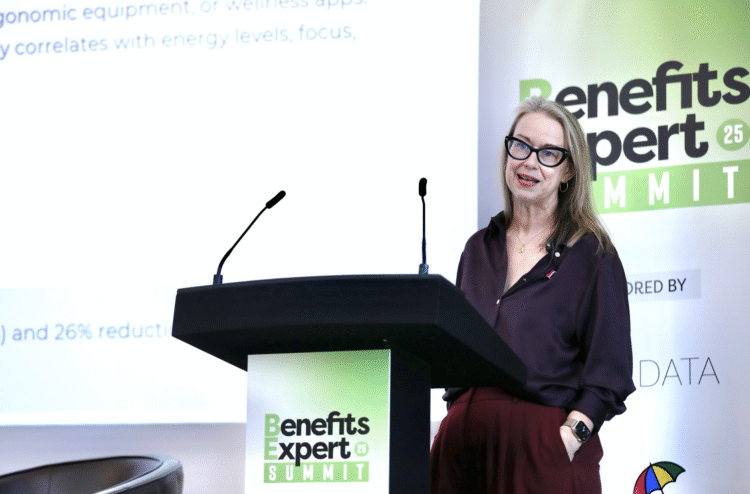Employee wellbeing is not a perk but a core driver of productivity and retention, requiring employers to take a holistic, evidence-based and personalised approach to physical, emotional and financial support.
Speaking at the Benefits Expert Summit, Royal British Legion executive director Amanda Arrowsmith discussed the three dimensions of wellbeing: physical, emotional and financial and explained how the right benefits can “make a tangible difference.”
“It’s actually fundamental when employees are not well, be it physically, emotionally or financially, it shows up in business outcomes. We see it in turnover, disengagement, in mistakes and in missed opportunities.”
She argued that the benefits that employers offer should be designed to create the conditions for people to perform and stay, not just to look competitive in recruitment.
She emphasised that leaders need clear evidence to win investment in wellbeing initiatives. Citing the CIPD Health and Wellbeing surveys, she explained that average sickness absence has risen from 5.8 days in 2019 to 9.4 days in 2025, calling this “a massive jump” with significant business cost.
Arrowsmith highlighted that mental health and stress are now the top causes of absence, followed by minor illnesses, and warned that “stress has now got a separate classification for mental health because we’re seeing it so much.”
She added: “Presenteeism might cost employers more than absence because people are turning up but not fully engaged.”
Deloitte’s research shows poor wellbeing costs UK businesses £51 billion a year but delivers a return of £4.70 for every £1 spent on mental health interventions. She revealed: “That is what speaks to CEOs and CFOs.”
Arrowsmith stressed that workplace wellbeing is not about taking over state responsibilities but about “complementing them and supporting our employees within those systems.”
She said framing wellbeing as a strategic partnership helps employers position it as a business imperative rather than a charitable gesture.
She noted that many organisations still equate physical wellbeing with gym memberships, but “a fitness app or access to the gym isn’t inclusive.” She explained that cash plans offer a more accessible route, covering everyday healthcare such as physio, optical and dental costs and helping employees address issues earlier.
“If you can get employees to champion cash plans and share their stories, it’s far more powerful than your benefits team saying, ‘Here’s a great benefit.’”
Arrowsmith also encouraged employers to consider personal development or wellbeing allowances, explaining that even modest sums can have a big impact when employees choose how to spend them, whether on yoga, creative hobbies or new skills. This flexibility, she said, “translates into motivation, loyalty and performance.”
She highlighted the importance of restorative holidays, noting that many employees use annual leave for professional development or continue checking emails while away.
She warned that financial wellbeing “can be a productivity killer” citing Deloitte figures estimating that financial stress costs UK employers £57 billion a year, with seven in ten employees saying money worries affect them at work.
According to Arrowsmith, practical interventions such as salary saving schemes, affordable loans and financial education aren’t grand gestures, but they genuinely help employees feel secure and that stability supports performance.
She noted that generational assumptions are outdated and employers must design benefits that evolve with people’s life stages. She pointed to US employers who allow early-career staff to redirect pension contributions toward student loan repayment, improving retention as well as Dutch firms enabling employees to work fewer days on full pay before retirement.
“It’s about designing benefits that recognise the realities of modern working life. We want personalisation in everything we do at home and at work, so we want it in our benefits too. Recognising employees as human beings with differences increases engagement, trust and perceived value.”
She added: “Wellbeing is good for business. It’s good for people. The best benefits don’t just make employees feel cared for, they free up energy and give people space to do their best work. We need to stop thinking about wellbeing as a perk and start seeing it as infrastructure for productivity. When people feel supported as whole human beings, they don’t just show up, they thrive. And when they thrive, so does business.”












